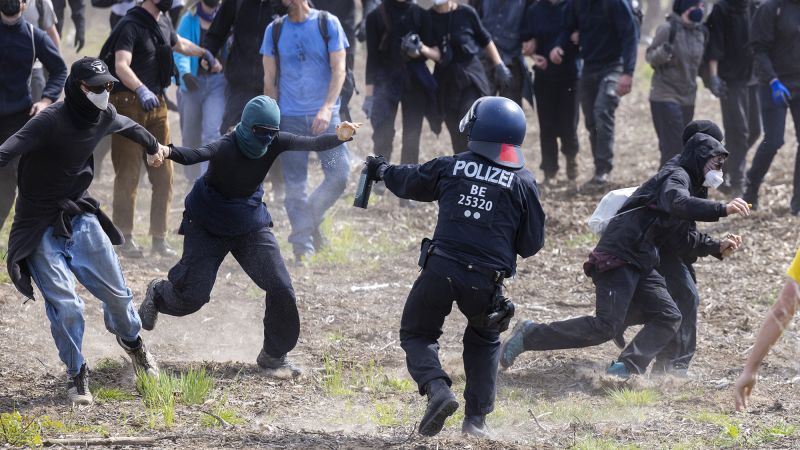Approximately 800 activists gathered outside Tesla’s factory near Berlin to protest its expansion plans, resulting in clashes with police as they tried to break into the plant. The protest organized by Disrupt, a coalition of anti-capitalist groups, caused rail traffic disruptions between Erkner and Fürstenwalde. Despite their attempts, police prevented the group from entering the Tesla premises, leading to instances of police violence as reported by Disrupt spokesperson Ole Becker. Tesla CEO Elon Musk confirmed on social media that protesters did not breach the fence line, ensuring the factory’s security.
Disrupt argues that Elon Musk’s plans to increase Tesla’s production capacity in Europe would harm the local environment, requiring clearing of forest areas and straining the water supply. The protests against the expansion began on Wednesday and escalated on Friday, prompting Tesla to shut the factory and cease production in anticipation of the protests. This precaution was taken after a previous incident in March where activists burned a high-voltage electricity pylon supplying power to the factory, leading to a temporary closure.
Tesla and the police in the German state of Brandenburg, where the plant is located, have not responded to requests for comment from CNN. The company’s decision to halt production and the heightened security measures were in response to the expected disruptions caused by the protests. Police in Brandenburg announced extensive operations in preparation for the protests, with support from federal police and neighboring state police forces. They warned of potential criminal acts during the protests and assured that they are ready to intervene resolutely to maintain peace.
The disruption caused by the protests has highlighted the tension between environmental activists and corporations like Tesla, with concerns about the impact of industrial expansion on the local ecosystem. Despite the clashes and interruptions to rail traffic, both sides are trying to assert their positions and maintain control of the situation. The ongoing protests reflect a broader debate about balancing economic growth with environmental sustainability, as communities and activists push back against large-scale industrial projects like Tesla’s factory expansion. The outcome of these protests will likely have implications for future projects and the relationship between corporations, activists, and local governments in addressing environmental concerns.


